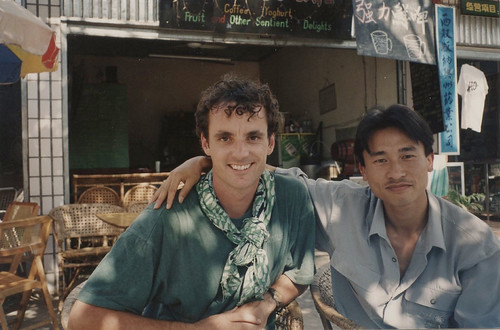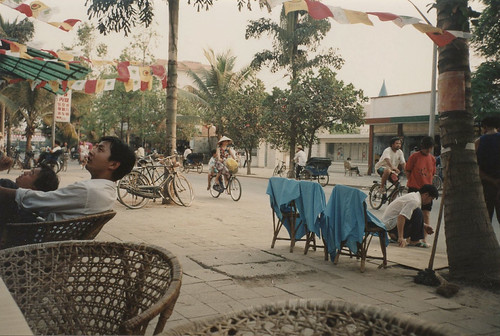
I didn't mind because I wasn't hanging around for the festival: I wanted to cycle up through Yunnan to Dali, some 800km to the north. Everyone said it would be impossible, too many hills, but I wanted to see for myself. Chuchu's Cafe ('Coffee, Yoghurt, Fruit and Other Sentient Delights') was bustling with an influx of young Hong Kongers wearing tie-dye batik and silly hats, waiting for the festival. I had already come across the Hong Kongers bargaining in bad Mandarin, raising their voices and gesticulating in exaggerated despair, like East End barrow boys. The Taiwanese, by contrast, favoured the quiet approach.

One of Chuchu's regular customers was Robert, from Taipei, who described himself as in the import-export trade, based in Jinghong. Most of his business was in Burma, Laos and Vietnam. 'How do you manage for visas?' I asked him. 'I don't, I just cross where there are no checkpoints.' he said. Robert spent a couple of hours telling me the price of everything in Taiwan: housing, food, a cup of coffee. And he wanted to know how much everything cost in London. 'So cheap,' he said, when I told him the average price of a London house. 'In Taipei you couldn't get a small apartment for that.' Robert reeled off statistics about Taiwanese businesses in South-East Asia: billions of dollar in Vietnam, Thailand and Burma. 'So how is business in Taipei these days?' I asked. 'Terrible,' he said. 'What?' Then I realised he had used the Chinese word 'Lihai', which can mean both 'terrible' and 'excellent'. 'Well, we Taiwanese are just naturally smart,' he -said with a smile, 'Not like in the west, where all your factories are closing down'.
I told him I lived in New Zealand, where there were few factories. 'I'd like to go on holiday there, I've heard it's very beautiful. Taiwan is so dirty and polluted. But you can't have progress without pollution,' he said. The young cafe owner, Wang. came over and sat with us. I found this strange after the way Robert had been treating him like a serf, but neither seemed perturbed. 1 asked Wang what he thought about the one-child policy. 'We Chinese can only have one kid. hut the minorities like the Dais can have two, and some of the hilltribes can have four. If we Chinese have more than one we get fined 5,000rmb. But that's not much money to some people these days,' he said. 'And there are ways around the system if you know how - when a couple really want to have a son, the wife just goes to another province to have her baby. ft' it's a boy she can bring it home and register it as her official child,' he said.

Then Wang sloped off to get us some watermelon. I struck up conversation with Gerald, a tall German with a goatee beard and a strong English accent. He had worked for the Midland Bank for ten years, and now he was 'doing' Asia. Gerald was not taking his trip lightly: he carried a miniature satellite navigation tracking system with him: a little black box that could pinpoint his position to within 50 metres. 'That's for when I go to Mongolia,' he said. Gerald had already passed through Burma, which he described as a virtual colony of China. 'All the shops are full of Chinese-made goods. The Chinese have even pushed Their borders forward a few kilometres into areas controlled by the heroin warlords.' But Gerald was enjoying his trip to China. 'The people are so much more helpful than when T came five years ago, he said. 'Now there isn't so much 'meiyou' anymore. People are more flexible, and they are prepared to offer you a service if they can make some money out of it.'
We began a debate, which became more heated, about whether China's booming economic progress could keep on track, with the threat of social instability and demands on natural resources. Gerald, the investment banker, became more emphatic that nothing could stop the Chinese economic Juggernaut. I got fed up with his domineering manner and turned to talk to a Thai women at the next table. She was up from Chiang Mai with her American husband, for the festival. 'Can you communicate in Thai with the Dai people here?' I asked her. 'No, they speak a northern hill tribe dialect here, not Thai,' she said in a rolling almost Indian accent. 'My grandmother would be able to talk with the old people here. but I can't understand them.
In Thailand the government has made everyone in the north learn standard Thai. And here all the young people speak Mandarin now.' 'And how do the Dai compare with the Thai people at home?' 1 asked. 'They are not the same, especially the young men: They seem just like Chinese men, I cannot tell the difference. But the young women here look beautiful.' she said. 'I tike the way they wear the traditional dresses and have make up. just like Thai girls.' And they don't get sold off to work in the bars of Patpong, I thought. Or did they?
No comments:
Post a Comment